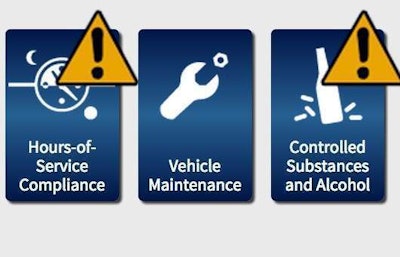
FMCSA is proposing to make public the hazmat BASIC rankings and data, along with changing the intervention thresholds for some other basics. Proposed intervention threshold changes include: lowering the interventional threshold of the vehicle maintenance BASIC to 75 percent from its current 80 percent, thus targeting more carriers, and raising the intervention threshold of the controlled substances BASIC to 90 percent from its current 80 percent, thus targeting fewer carriers.
Below is a look at some of the formal public comments that were submitted on the proposed changes. FMCSA says it will consider the comments in crafting the final version of the changes it will make to CSA and the SMS system within it.
Owner-Operator Independent Drivers Association: In its formal comments submitted on the rule, OOIDA said the changes fail to address some of the main concerns the industry has with the CSA program. “None of the proposed changes resolve the fundamental problems with the system that cause it to damage good carriers’ safety reputations and not accurately identify the worst motor carriers,” OOIDA wrote.
“OOIDA encourages the agency to scrap the current system, pursue a more aggressive effort to identify the real factors that cause crashes, and use that information to create an objective safety standard that is accurate and reliable. Once it creates such a system, it should devise more effective strategies to intervene with motor carriers who are truly at a higher risk for crashes.”
American Trucking Associations: ATA says the proposed changes miss the mark in addressing safety improvements that could be made.
“After having a year to consider the recommendation from the National Transportation Safety Board-requested Independent Review Team to distinguish form and manner violations from those that cause crashes, FMCSA appears to have dismissed it out of hand,” said Rob Abbott, ATA Vice President of Safety Policy. “We find this very troubling because the agency is missing an opportunity to improve safety by placing more focus on high-risk carriers.”
ATA also criticized FMCSA for making the hazmat BASIC public.
“ATA has repeatedly called on the agency to remove the scores CSA produces from public view while it fixes these serious issues,” Graves said. “Ironically, while Congress is putting final touches on legislation to require that FMCSA take this step, the agency is only proposing superficial changes to the system and actually suggests making more flawed data public.”
FedEx: FedEx in its comment said — reflecting one of the industry’s oft-cited problems with the program — it’s concerned that CSA’s flaws make carriers’ scores unreliable.
“FedEx’s top priority is safety and that includes compliance with the FMCSA’s safety regulations. While FedEx supports efforts by the FMCSA to improve the SMS, and thus the CSA program, FedEx is concerned that the totality of flaws in the CSA program, not just those problems identified and addressed in this Notice, collectively make motor carriers’ CSA scores unreliable and not reflective of crash risk.”
Con-way: Con-way said it supports “adjustments to the intervention thresholds to better prioritize carriers for intervention and roadside inspections to determine if the carrier maintains appropriate safety programs to prevent crashes.”
The company added, though, that it doesn’t support “public display of information that does not reflect an individual carrier’s safety performance. FMCSA should take great care to use data and violations that have a direct relationship to crashes. A violation that statistically but indirectly relates to crashes does not mean the carrier is unsafe, and that data should not be displayed to the public and should be used to a much lesser extent to focus enforcement resources if at all.
Commenter Steve Gale: Gale said he’s in favor of keeping the rules as they are currently and enforcing them properly.
“The only thing missing from achieving the safety goals is swift enforcement. I can’t tell you how many drivers I talk to that work for companies that still have the freight in front of safety — it’s a joke. Enforcement is the last hurdle to clean up this industry and make it a legitimate industry. As far as tweaking the current system, I say leave it alone. I see a lot of special interest groups trying to manipulate the rules, keep it simple. Crack down on the non-compliant operators.”











